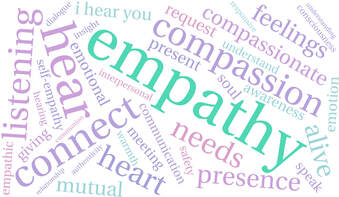It’s hard to overstate the power of empathy. Its presence can soothe the deepest hurt, and its absence can often hurt more than the original wound. Empathy is frequently what people come to therapy looking for.
First, what exactly is empathy? It’s common practice for sympathy, empathy, and compassion to be used interchangeably, which can be confusing. They are related, but the differences are important. Here’s a brief refresher on how to distinguish between the three. Merriam-Webster Dictionary defines empathy as, “the action of understanding, being aware of, being sensitive to, and vicariously experiencing the feelings, thoughts, and experience of another of either the past or present without having the feelings, thoughts, and experience fully communicated in an objectively explicit manner.” It goes on to differentiate empathy from sympathy, “… sympathy implies sharing (or having the capacity to share) the feelings of another, while empathy tends to be used to mean imagining, or having the capacity to imagine, feelings that one does not actually have.” Finally, “Compassion is the broader word: it refers to both an understanding of another’s pain and the desire to somehow mitigate that pain” (https://www.merriam-webster.com/dictionary/empathy). I often have clients ask me how they can be more empathetic, which is a great question, but more often than not people already know more than they give themselves credit for. Be present, be a good listener, validate, etc. The more difficult questions might be, despite knowing the basics of what to do, why don’t I do it? Why doesn’t my partner feel heard, understood, or cared for even though I’m trying so hard? If you’ve ever wondered, maybe I’m just not an empathetic person, I’m happy to let you know that is simply not the case. There are many reasons why people have difficulty tapping into this emotion, and while some people may be more predisposed for greater empathetic understanding, it is definitely possible to increase one’s ability to empathize. One major stumbling block to empathy is not separating out feelings from behavior. This is a common misunderstanding in adulthood because it is commonly learned in childhood. When a child is mishandling his emotions, as children tend to do, it’s unfortunate when parents communicate, “don’t feel that way” instead of, “don’t act that way”. Feelings are rarely, if ever, a problem. They give us feedback about what is going on with us. It’s what we choose to do with our feelings that is either constructive or destructive to ourselves and those around us. When feelings and behavior are addressed as one and the same, it leads to judgment, misunderstanding, and disconnection. For example, imagine the following scenario. A husband and wife are in the car. The husband is in a rush for specific reasons he has not communicated to his wife, and when unexpected traffic is encountered, he begins to yell and drive more aggressively than his wife is comfortable with. She says, “You’re being ridiculous and irrational. You need to calm down. It’s not that big of a deal if we’re late.” These comments are a reaction to his behavior of yelling and driving recklessly, but her words are saying she has a problem with his feelings not his behavior. In fact, because of this, her husband is more likely to feel invalidated and double down by defending himself. Separating feelings from behavior allows one to validate the emotions, while disagreeing with the way they’re being handled. Such a response may sound like this, “I get that you’re in a hurry and it’s frustrating that the traffic is bad, but you’re not driving safely and I don’t appreciate the way you’re handling your frustration. It’s scaring me. Can you please be safe and explain why you’re in such a rush?” Not only do empathetic responses feel better to the other person, they also help us feel better towards the other person. Did you notice the judgment in the first comment from the wife? That tends to happen when feelings and behavior are viewed as the same thing. Wrong behavior is seen as wrong feelings, and judgment ensues. Rather, when you take the stance that all feelings are valid and there must be a very good reason the other person is feeling the way he or she does, it is much easier to want to seek understanding versus judgment. With judgment out of the way, it also makes it easier to put yourself in the shoes of the other person and genuinely imagine what it might be like for them. Another reason it can be difficult to distinguish between feelings and behavior is our communication style blurs the line between the two. I’m definitely guilty of this one, and it can be a tricky habit to break. If your partner is not giving you the empathetic response you like, ask yourself if you’ve communicated your feelings directly using clear emotional language. In other words, if you say, “These dishes have been sitting in the sink all day!” Don’t be surprised to get the reply, “Actually, they’ve only been there the last few hours.” You may be more inclined to get a better response to, “I’m disappointed the dishes are still in the sink after you said you were just about to do them three hours ago. Can you please do them now?” Couples can easily miss the heart of what the other is saying when feelings are expressed using “facts” or “behavior” language. This makes sense, because feelings language is much more vulnerable, but this vulnerability is exactly why it is more effective. People are empathetic to feelings not facts. Can you relate to this particular empathy blocker? Do you want to work on it? Here are a few things to do to get started: Take an empathy quiz: https://psychology-tools.com/test/empathy-quotient Ask your partner, a family member, or a close friend if they’d be willing to give you some honest, constructive feedback on how you convey empathy. As it relates to separating feelings and behaviors, reflect on the following questions: How were feelings addressed in my family growing up? Now? Was communication about bad behavior clear and direct, or did I often feel my emotions were minimized or invalidated in the process? How did I feel when that happened? Practice rephrasing a few requests or complaints into feelings language. Did you get a more empathetic response? Stay tuned for part two of this blog coming soon! We’ll be exploring two more stumbling blocks to empathy. Comments are closed.
|
Categories
All
Archives
March 2023
|
[email protected]


 RSS Feed
RSS Feed